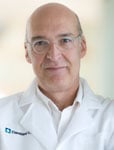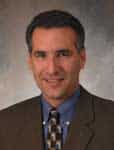An Evolving Treatment Landscape for Inflammatory Disease: Debating Interchangeability, Efficacy, and Safety of Biosimilars
CMEO Live and On Demand
Premiere Date: Thursday, July 27, 2017
Live Broadcast: 12:00–1:30 p.m. ET
Taped Re-Air: 4:00–5:30 p.m. ETThis activity offers CE credit for:
- Physicians (CME)
- Nurses (CNE)
- Pharmacists (ACPE)
- Other
All other clinicians will receive a Certificate of Attendance stating this activity was certified for AMA PRA Category 1 Credit™
Credit Expiration Date: Friday, July 27, 2018
Faculty
 |
Leonard H. Calabrese, DO (Moderator) Professor of Medicine Vice Chair, Department of Rheumatic & Immunologic Disease Cleveland Clinic Lerner College of Medicine of Case Western Reserve University R.J. Fasenmyer Chair of Clinical Immunology Cleveland Clinic Foundation Cleveland, OH |
 |
Russell D. Cohen, MD, FACG, AGAF Professor of Medicine, Pritzker School of Medicine Director, Inflammatory Bowel Disease Center Co-Director, Advanced IBD Fellowship Program University of Chicago Medicine Chicago, IL |
 |
Edward Li, PharmD, MPH, BCOP Professor University of New England College of Pharmacy Portland, ME |
Statement of Need
Health care spending has grown much faster than the rest of the economy, and this trend is seemingly unsustainable.1 Biologic agents are highly effective against inflammatory diseases, but may be restricted by many health care plans due to cost. Biosimilars offer a potential solution as a cost-effective alternative to biologic agents. Biosimilars have been available in Europe since 2005. In the United States, the first biosimilar monoclonal antibody, infliximab, was approved for rheumatoid arthritis (RA), adult ulcerative colitis (UC), psoriasis, psoriatic arthritis (PsA), ankylosing spondylitis (AS), and adult and pediatric Crohn’s disease (CD).
A biosimilar is a “biopharmaceutical that is genetically engineered, designed to be highly similar to an existing approved biologic product. Highly similar means that any difference is minor and not considered to be clinically meaningful. Biosimilars are expected to have biologic activity similar to that of existing, approved biopharmaceuticals and comparable efficacy and safety based on a full assessment that includes analytical, preclinical, pharmacokinetics (PK), pharmacodynamics (PD), and clinical studies.”2
In this CME Outfitters Live and On Demand activity, expert faculty will highlight the patient voice while engaging in an evidence-based debate that addresses all aspects of biosimilars including safety, efficacy, and best practices for use.
References:
1. Feagan BG. Debate: biosimilars – use as indicated, in place of our current biologics. Presented at: 2015 Advances in Inflammatory Bowel Diseases: Crohn’s & Colitis Foundation’s Clinical & Research Conference; December 6-9, 2015.
2. Kay J. A primer on biosimilars: how do biosimilars compare with reference biologics and generics? Medscape Website. http://www.medscape.org/viewarticle/837696. Published May 28, 2015.
Learning Objectives
At the end of this CE activity, participants should be able to:
- Summarize interchangeability of biosimilars with reference biologics and how it impacts clinical practice.
- Distinguish biosimilars from generic agents in the management of inflammatory diseases.
- Debate and evaluate the safety and efficacy of emerging biosimilars in the treatment of inflammatory diseases.
Financial Support
Supported by an educational grant from Pfizer Inc.
Target Audience
Physicians, pharmacists, physician assistants, nurse practitioners, and nurses treating patients with inflammatory diseases.
Credit Information
CME Credit (Physicians):
CME Outfitters, LLC, is accredited by the Accreditation Council for Continuing Medical Education (ACCME) to provide continuing medical education for physicians.
CME Outfitters, LLC, designates this live activity for a maximum of 1.5 AMA PRA Category 1 CreditsTM. Physicians should claim only the credit commensurate with the extent of their participation in the activity.
CNE Credit (Nurses):
Provider approved by the California Board of Registered Nursing, Provider Number CEP 15510, for 1.5 contact hours
Note to Nurse Practitioners and Clinical Nurse Specialists: the content of this activity pertains to pharmacology. Earn up to 1.5 contact hours of pharmacotherapeutic contact hours.
Note to Nurse Practitioners: Nurse practitioners can apply for AMA PRA Category 1 CreditTMthrough the American Academy of Nurse Practitioners (AANP). AANP will accept AMA PRA Category 1 Credit(s)TM from organizations accredited by the Accreditation Council for Continuing Medical Education. Nurse practitioners can also apply for credit through their state boards.
CPE Credit (Pharmacists):
![]() CME Outfitters, LLC, is accredited by the Accreditation Council for Pharmacy Education as a provider of continuing pharmacy education. 1.5 contact hours (0.15 CEUs) Universal Activity Number:
CME Outfitters, LLC, is accredited by the Accreditation Council for Pharmacy Education as a provider of continuing pharmacy education. 1.5 contact hours (0.15 CEUs) Universal Activity Number:
Live: 0376-0000-17-031-L01-P
Enduring: 0376-0000-17-031-H01-P
Type: Knowledge-based
Note to Physician Assistants: AAPA accepts certificates of participation for educational activities certified for AMA PRA Category 1 CreditTM from organizations accredited by the Accreditation Council for Continuing Medical Education.
Post-tests, credit request forms, and activity evaluations must be completed online at www.cmeoutfitters.com/TST22266 (requires free account activation), and participants can print their certificate or statement of credit immediately (75% pass rate required). This website supports all browsers except Internet Explorer for Mac. For complete technical requirements and privacy policy, visit www.neurosciencecme.com/technical.asp.
Disclosure Declaration
It is the policy of CME Outfitters, LLC, to ensure independence, balance, objectivity, and scientific rigor and integrity in all of their CE activities. Faculty must disclose to the participants any relationships with commercial companies whose products or devices may be mentioned in faculty presentations, or with the commercial supporter of this CE activity. CME Outfitters, LLC, has evaluated, identified, and attempted to resolve any potential conflicts of interest through a rigorous content validation procedure, use of evidence-based data/research, and a multidisciplinary peer review process. The following information is for participant information only. It is not assumed that these relationships will have a negative impact on the presentations.
Dr. Calabrese reports that he is a consultant for AbbVie Inc.; Centecor Biopharmaceutical; GlaxoSmithKline; Horizon Pharma; Janssen Pharmaceuticals, Inc.; Pfizer Inc.; Regeneron Pharmaceuticals, Inc.; and UCB, Inc.
Dr. Cohen reports that he is serves as consultant / advisory / scientific advisory board for AbbVie Inc.; Celgene Corporation; Eli Lilly and Company; Hospira, Inc.; Janssen Research & Development, LLC (Johnson & Johnson / Centocor); Pfizer Inc.; Sandoz Biopharmaceuticals; Takeda Pharmaceuticals U.S.A., Inc. and UCB, Inc. He is the principal investigator in clinical trials for AstraZeneca; Celgene Corporation; Gilead Sciences, Inc.; Medimmune; Mesoblast Ltd.; Osiris Therapeutics, Inc.; Pfizer Inc.; Receptos, Inc.; RedHill Biopharma; Sanofi-Aventis and UCB, Inc. He serves on speakers bureau for AbbVie Inc. and Takeda Pharmaceuticals U.S.A., Inc. He has disclosed his spouse is on the board of directors for Protein Sciences Corporation; Tokai Pharmaceuticals, Inc.; Vital Therapies, Inc. and CytRx Corporation.
Dr. Li reports that he serves on speakers bureau for Apobiologix and Pfizer Inc. He serves as consultant for Mylan and Pfizer Inc.
Daniela V. DiBiase, MS (planning committee) has no disclosures to report.
Sharon Tordoff, CHCP (planning committee) has no disclosures to report.
Disclosures were obtained from the CME Outfitters, LLC staff: No disclosures to report.
Faculty of this CE activity may include discussions of products or devices that are not currently labeled for use by the FDA. The faculty have been informed of their responsibility to disclose to the audience if they will be discussing off-label or investigational uses (any uses not approved by the FDA) of products or devices.
